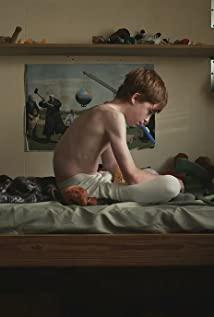What this film reflects is a cruel reality, but this is not the theme that the film director wants to express. The positive energy of love to heal pain is what the film really wants to tell. The plot development of the film is both a love. The transmission process is also a process of healing trauma. In this process, not only the children in the recipient’s shelter, but also the staff in the giver’s shelter are helped. Every character is in this process. After experiencing a spiritual sublimation, individual changes are also driving the improvement of the collective.
At the beginning of the film, we saw the terrible situation in the juvenile shelter. Mason and the new social worker Knight talked about the hard work and various embarrassing situations. Sammy went crazy early in the morning and got out of control and needed multiple people. Only by working together can he control his emotions. Even after the state is stable, he is always sensitive and fragile, always holding the toy of his deceased sister. Marcus is about to reach adulthood, but he is afraid that he will not leave the shelter in the face of society. Louis is unobtrusive and always loves to mock others. No one will let it go. The other children here also have their own problems. The conditions in the juvenile shelter made Knight a little bit overwhelmed. The newcomer compared these children to people from the bottom of society. He came here more to experience another kind of life, not to show them care, so we see However, he couldn't fully integrate into this job. He was slow when chasing the out of control Sami and kept his distance from the children. Grace and Mason are very devoted to the care of these children, but their relationship has changed. Mason is an orphan, raised by a couple who specializes in taking care of children like him, and hopes to have a stable life. 'S small family, and Grace found out that she was pregnant at this time, but she was unwilling to keep the child, and she was unwilling to tell Mason the real reason. Everyone here has their own problems and is in an unstable state. They all need the help of a kind of strength, not only the children, but the staff as well.
The arrival of another newcomer, a problem girl named Jaden, broke the original predicament here. It was not because of what she did, but Grace saw the epitome of her childhood from her, and they all suffered. The injuries of domestic violence have never been able to get out of the shadows, and the experiences that could not be told in the past have always hurt them. It is precisely because of similar experiences that Grace is particularly concerned about her situation and can understand Jaden’s situation better than others. In order to protect her, Grace did not hesitate to fall out with the dean, and even broke into Jia with a tool in her hand. Deng’s family punishes Jaden’s father, the perpetrator. While encouraging Jaden to bravely stand up and accuse her father, Grace also overcomes her fears, walks out of the shadows of the past, and is determined to welcome a new life. One person completes self-transformation by helping another person. At the same time that Jaden and Grace changed, we found that other characters were also quietly changing. In order to encourage Jaden to lead other children to make cards for her, Marcus finally decided to leave the shelter and accept a new life. Sami gradually accepted the reality of her sister's death, learned to live a happy life, and even joked with the nurses. Knight began to care about these children from the heart and sent Sammy his lost toys. The estrangement between Mason and Grace is also resolved, and Mason helps Grace share more and more work.
In this process, the children here accepted the help of the caregivers, they walked out of their shadows, and the caregivers also discovered new selves in the process of helping them. With the help of others, Grace and Mason went through the most difficult period. They put the same love on these children, and the children who were influenced by them got a new understanding of life, and then devoted themselves to others. With the help of people. The power of love and tolerance has been passed on from generation to generation in them. Finally, we saw that when a few people gathered under the tree to chat again, they still told what happened to these children, but what we heard was no longer the story of the tragic ending at the beginning, but Marcus's departure. Wonderful life after the shelter.
In order to complete the expression of the theme, in addition to setting the contrast of the main characters before and after, the comparison between the related characters and the negative characters is also set in the film. Their behavior constitutes the greatest hindrance for Grace and the children in the shelter. The dean, as the administrator of the shelter, should help the children here to get out of trouble, but in fact he did not do his duty. When Grace discussed with him about the children in the shelter, all he cared about was the superiority of the lamp he bought. Sex, when he knew that Jaden had suffered domestic violence, he still obeyed the rules and asked Jaden’s father to pick her up. He didn’t care for the children here. When this attitude of indifference is placed on ordinary people, it may not matter, but When the dean of a shelter is like this, his inaction is a kind of injury in itself, which puts Jaden in danger of domestic violence once again. Like the dean, the therapist lacked communication with the children and often made wrong judgments. They took Sami's toys as a treatment method, but they plunged Sami into a more serious panic. The perpetrators are the source of harm. Grace's father, Jaden's father, Marcus's mother, and the murderer of Sami's sister are the culprits. However, neither of them nor their violent behavior is positively shown in the film. Regarding the process of violence, we can only learn from the narration or speculation. Although there is no direct representation of the picture, we can still imagine the cruelty of the process of injury from their current situation. It is the cruelty that has not been shown that makes us feel the same pain as them, so that the entire film is wrapped in a repressive atmosphere, and the need to break through this repression has become more urgent. The setting of these villains, on the other hand, reflects how difficult it is for Grace and her party to stand up, and is also their motivation for breaking through obstacles in the end.
The film is about a realistic problem, but what it wants to convey is a positive attitude toward such a realistic problem. Therefore, the expression method adopts realistic presentation and appropriate warmth. All the actors in the film did not choose handsome men and women, and did not add makeup to beautify the characters. Only to express Jaden's rebellious personality, there were traces of poor makeup skills on her face. In the use of music, emotional music rarely appears in the whole story, especially in the first half of the film. Only a short period of emotional music can be heard when the plot is relaxed and cheerful, such as when the Masons are together, and when dealing with unfortunate real problems Even when using music, it is achieved by using real-world sound. Grace found Marcus's knives, and Marcus was extremely angry. As the problems were solved one by one, the music in the film began to increase, especially at the end, when Sammy pretended to escape, not only the cheerful and funny music played, but the scene was transformed into upgraded shots to strengthen this cheerful mood. The whole story Reaching the highest emotional point, and ending the film with this, implying that the problem can be solved and a good vision for the future. In order to fit the reality of the content of the film, handheld photography is used almost throughout the film. The characters mostly appear in medium and close shots, accompanied by a small number of close-ups. There are few large close-ups or distant views. This selection of scenes and handheld photography are caused The slight jitter of the picture presents a sense of closeness, making it easier for the audience to feel the authenticity of the event and the oppressive feeling of the characters in the film, and the emotion of wanting to break through the constraints is packed in a narrow frame. Although the film photography technique creates a sense of depression, there is no real violent scene in the selection of the content of the screen. The unfortunate incidents are mostly shown from the side or hinted in other ways. None of the scenes of the characters encountering violence appeared, they were all dictated. When Grace learns that her father is going to be released from prison, she uses her finger to imply that his father's harm to her has not disappeared. When Jaden's father came to pick her up, the picture on the TV next to Jaden was a picture of a shark opening her mouth, suggesting that she was in danger. Marcus committed suicide. We only saw blood on the ground, but did not see the process of his suicide. After the problem was finally solved, the doll in the venting room fell down as a sign of victory.
Children suffering from domestic violence is not something that only happens today, nor is it something that can be ended today. The misfortune they encounter needs the help of society and the transmission of this positive energy. Among them are extraordinary and talented people. There are countless possibilities in their lives. They can be Sunshine Avenue or deep in the mud. What kind of possibility is it? For the young, they rely more on society. Response. Characters like Grace in the film are a positive response to such incidents. They are angels out of the mud, and the transmission of love is endless.
View more about Short Term 12 reviews











